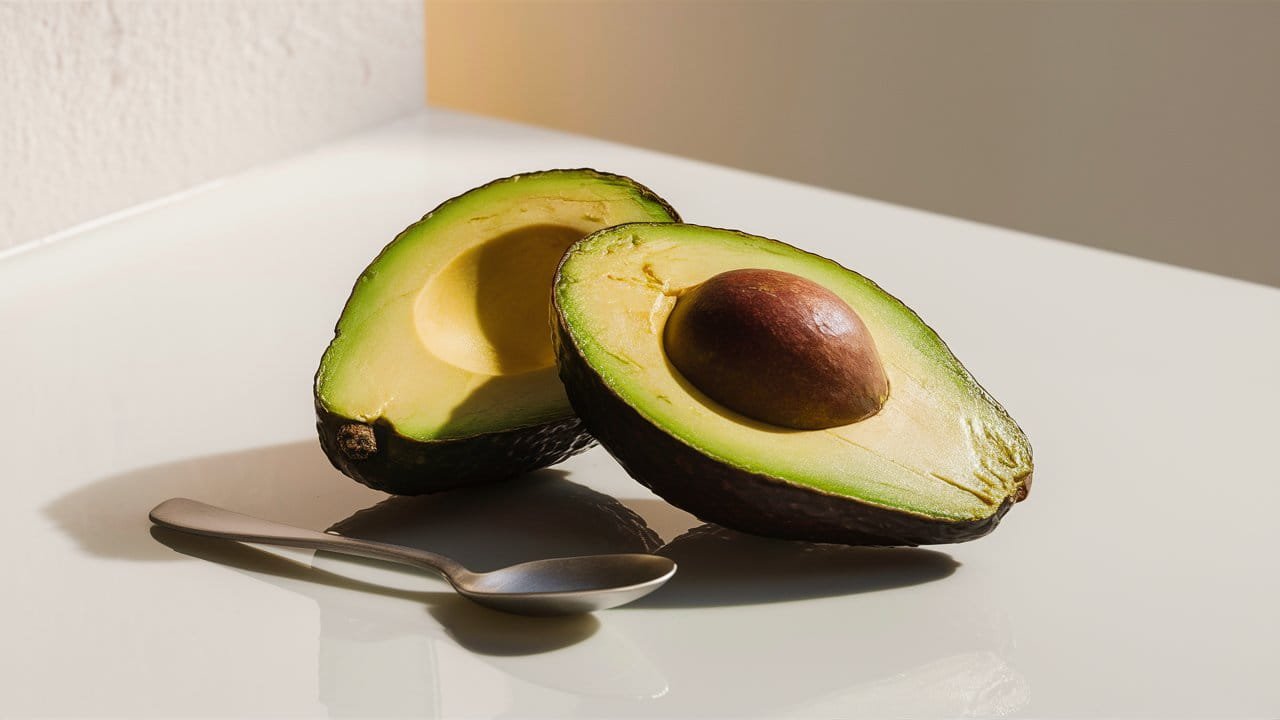13 PROVEN Avocado Health Benefits According To Research

An avocado a day keeps the doctor away! This superfood is loaded with health benefits, and the best part is – they are absolutely delicious and go well with practically every recipe, and can be added to almost any meal, so it is very easy to incorporate them into a well balanced diet.
You can add them onto, and into, just about anything…even a smoothie! So buckle up and experience the proven health benefits of avocado as told by the experts and scientific studies.
1. Promotes Satiety and Weight Management
According to a recent study, eating half of an avocado will help increase satiety and leave you feeling full for up to 5 hours after the meal.
Adding an avocado to your breakfast or lunch is a great way to curb the need for constant snacking throughout the day. It’s the perfect ingredient to incorporate into your dieting meal plans.

2. Packed with Nutrients
Avocados make it easy to get a good amount of all the recommended vitamins and minerals for the day because each serving is packed with over 20 vitamins and minerals.
Here are the nutritional facts for one serving (50g) – which is 1/3 of a medium size avocado.

A whole avocado is about 3 servings. Here are the nutrition facts for a whole avocado (150g):
| Nutrition Facts | Amount Per Whole Avocado (150g) | % Daily Value* |
|---|---|---|
| Calories | 240 | 12% |
| Total Fat | 24g | 30% |
| Saturated Fat | 3g | 15% |
| Trans Fat | – | – |
| Polyunsaturated Fat | 3g | – |
| Monounsaturated Fat | 15g | – |
| Cholesterol | 0mg | 0% |
| Sodium | 0mg | 0% |
| Total Carbohydrate | 12g | 4% |
| Dietary Fiber | 9g | 33% |
| Total Sugars | 0g | – |
| Protein | 3g | – |
| Vitamin D | 0mcg | 0% |
| Calcium | 30mg | 2% |
| Iron | 0.9mg | 6% |
| Potassium | 750mg | 18% |
| Vitamin A | 0mcg | 0% |
| Vitamin C | 12mg | 12% |
| Vitamin E | 3mg | 18% |
| Vitamin K | 33mcg | 30% |
| Thiamin | 0.12mg | 12% |
| Riboflavin | 0.3mg | 24% |
| Niacin | 3mg | 18% |
| Vitamin B6 | 0.3mg | 18% |
| Folate (0mcg folic acid) | 135mcg DFE | 30% |
| Pantothenic Acid | 2.1mg | 45% |
| Phosphorus | 90mg | 6% |
| Magnesium | 45mg | 12% |
| Zinc | 0.9mg | 6% |
| Copper | 0.3mg | 30% |
| Manganese | 0.3mg | 12% |
*Percent Daily Values are based on a 2,000 calorie diet.
3. Healthy Fats
Healthy fats are essential for your overall wellness as they support skin health; they enhances the absorption of fat-soluble vitamins, minerals, and other nutrient, and they help boost the immune system.
These fats can even help reduce the risk of strokes, heart attacks, and bad cholesterol levels.

4. Lowers Cholesterol
Regular consumption of beta-sitosterol and other plant sterols are known to help maintain healthy cholesterol levels, and avocados contain 25 milligrams per ounce of this beta-sitosterol.
On top of that, studies have shown that avocados help reduce the bad cholesterol known as LDL.
More specifically, this 2015 research published in the Journal of the American Heart Association, found that eating one avocado a day, as part of a diet low in saturated fat, helps lower bad cholesterol in overweight or obese people.
Compared to other diets with similar fat content, the avocado diet showed greater reductions in bad cholesterol and other risk factors for heart disease.
5. Manages Blood Pressure

Potassium has been proven to be very helpful in managing blood pressure and avocados are full of it. Eating an avocado can help you flush out excess sodium and ease the tension in your blood vessel walls because of how much potassium they contain.
6. Promotes Bone Health
Even though people usually connect only calcium and vitamin D to bone health, vitamin K is equally important.
It is what helps the body to absorb the calcium more efficiently. Without enough Vitamin K, the body does not absorb the calcium well and most of it ends up getting eliminated through urination. [1]
By eating a whole avocado you get almost half of the daily recommended intake of vitamin K in one go.
7. High in Fiber
An avocado is high in fiber, containing approximately 6-7 grams per half fruit. Eating them can help prevent constipation, maintain a healthy digestive tract, and lower the risk of colon, stomach, pancreatic, and cervical cancers.
By eating an avocado a day you promote regular bowel movements, which are important for the daily excretion of toxins through the bile and stool.
Some studies have even shown fiber to play a role in regulating the immune system and inflammation. Increased fiber intake has been shown to lower blood pressure and cholesterol levels, improve insulin sensitivity, and enhance weight loss for obese individuals. [2]
According to the Department of Internal Medicine and Nutritional Sciences Program of the University of Kentucky, “high fiber intakes are associated with significantly lower risks of developing coronary heart disease, stroke, hypertension, diabetes, obesity, and certain gastrointestinal diseases.”
8. Promotes Eye Health

Avocados contain higher doses of lutein and zeaxanthin than any other plant. These two very important natural ingredients are carotenoids necessary for eye health and vision.
They are phytochemicals that are especially concentrated in the tissues in the eyes where they provide antioxidant protection to help minimize damage, including from ultraviolet light.
Furthermore, the monounsaturated fatty acids in avocados also support the absorption of other beneficial fat-soluble antioxidants, such as beta-carotene.
That is why eating an avocado daily can help fight age-related macular degeneration like blindness and eye dysfunction.
9. Regulates Blood Sugar
Researcher found that avocados are beneficial for people with diabetes. In a study, they had diabetes patients eat an avocado every day. By the end of the experiment, the participants’ insulin and blood glucose levels evened out significantly.
Another review published on the journal Phytotherapy Research, looked at how avocado affects a condition called metabolic syndrome (MetS). MetS is when you have a bunch of health problems like high blood sugar, bad cholesterol, high blood pressure, and obesity.
These things make you more likely to get diabetes and heart disease. The study found that avocado might help with MetS because it has stuff like vitamins and healthy fats that can improve things like cholesterol and blood pressure.
Finally, Avocado seed and leaf extract show potential as promising antidiabetic agents, with avocado seed extract showing a more significant effect in reducing diabetes symptoms and avocado leaf extract showing promising potential in regulating blood glucose levels and lipid profiles.
10. Great for Pregnant Women
Avocados are full of folate, potassium, vitamin C and vitamin B6 which helps baby’s tissue and brain growth.
Adequate intake of folate (folic acid) reduces the risk of miscarriage and neural tube defects. This is why your doctor prescribes you with folate supplementation when you’re pregnant. These vitamins also help to alleviate your morning sickness.
As you can see, avocados are amazing for you and your growing baby. One good way to use an avocado is to spread it on toast instead of mayo for sandwiches.

11. Boosts Mood
Folate is good for more than just growing babies, it also prevents the build-up of homocysteine – a substance that can impair circulation and delivery of nutrients to the brain. [x]
Excess homocysteine can interfere with the production of important neurotransmitters such as serotonin, dopamine, and norepinephrine. [x] [x]
Therefore, elevated levels of homocysteine can potentially disrupt these essential functions, leading to mood disorders, sleep disturbances, and changes in appetite.
When your homocysteine levels are high, it can harm your brain by reducing blood flow and nutrient delivery. Getting enough folate is important to keep your brain working well and avoid memory problems.
Research suggests that a deficiency in folate and subsequent high homocysteine levels may be linked to an increased risk of depression.
Eating foods which are high in folate, might help lower the chances of getting depressed by making sure your brain makes enough neurotransmitters and stays healthy overall.
12. Has Antioxidant Properties
Avocado contains antioxidants that help protect the body from oxidative stress and damage caused by free radicals.
This 2019 study published in the journal “Antioxidants” talks about how avocado has a lot of antioxidants, which are good for your health. They found that the parts of the avocado plant like the peel, seed, and leaf have more antioxidants than the pulp.
These antioxidants, like phenolic compounds and tocopherols, can help fight oxidation and inflammation in your body. They also mentioned that ripe avocados have more antioxidants than unripe ones.
13. Helps With Cancer Prevention
Some studies suggest that avocado may have anti-cancer properties, although more research is needed in this area. Although most of these studies are in-vitro and observational, they do hold significance in paving the way for human or even animal trials.
- For example, this study found that a specific extract from avocado fruits can stop the growth of certain oral cancer cells. They identified two compounds in the extract that block important pathways in cancer development. When used together, these compounds work even better at stopping cancer cell growth. Avocado might have potential as a cancer-fighting food.
- This study compared the fat content of avocado seeds and fruit and tested their potential against cancer and inflammation. Avocado seed extract showed stronger effects against cancer cells and inflammation compared to fruit extract. It suggests that avocado seeds shouldn’t be ignored and could be valuable resource in fighting cancer.
- And finally, this study investigated the carotenoid content of avocados, focusing on the Hass variety. Avocados were found to be rich in lutein and other carotenoids, along with vitamin E. An avocado extract inhibited the growth of prostate cancer cells in lab tests, suggesting potential cancer-fighting properties beyond just lutein.
Bottom Line
As you can see, adding avocados to your daily meals has many health benefits. They’re full of important nutrients, fiber, and healthy fats that help you feel full and manage your weight.
Avocados also have potassium, good for controlling blood pressure, and vitamin K, which keeps your bones strong. They can help your eyes, blood sugar, and protect your body from damage.
Avocados might even help prevent cancer and support pregnancy. So, eating an avocado every day can be a simple way to stay healthy and enjoy tasty food.
CHECK MORE HEALTHY FOODS
